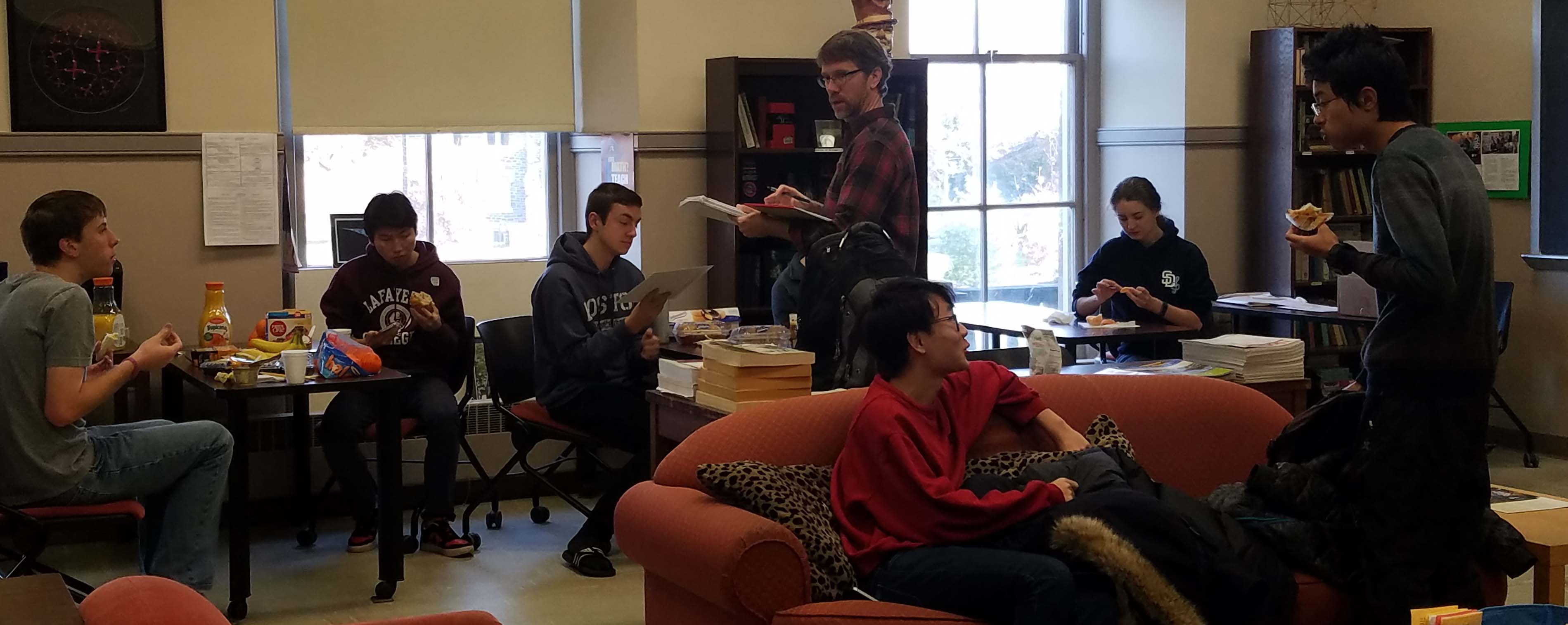By Katie Neitz
You don’t have to be a mathematician to know that free doughnuts + free pizza + cash prizes = a strong incentive package.
Indeed, 17 students opted for problem-solving instead of sleeping in on a brisk Saturday morning in mid-October. The group gathered at 9:45 a.m. on the second floor of Pardee for the math department’s annual individual Barge Mathematics Competition. The contest, which was open to first- and second-year students, consisted of 10 problems students needed to crack—or attempt to crack—in a two-hour time limit.
Associate Professor Derek Smith provided pastries, pizza, and encouragement as students vied for $500 (first prize), $300 (second prize), and $200 (third prize).
Bingsong Zeng ’20, a biochemistry major, won the competition after successfully answering five out of 10 problems. “The questions were difficult, that’s for sure,” says Zeng, who put his winnings toward his plane ticket home to China for winter break. “But there are ways to think through them, and when you can do that, it makes it fun.” Jon “Charley” Western ’20 took second; Xunyao “Bobby” Luo ’21 took third.
The Barge Competition was just the first of three Saturday problem-solving challenges the math department hosted during fall semester. The goal of each event was to encourage both scholarship and camaraderie among math majors, minors, and anyone with an interest in putting their knowledge of geometry and algebra to the test, says Smith.

In November, students from six Lehigh Valley institutions came to Lafayette to compete in the Lehigh Valley Association of Independent Colleges (LVAIC) Mathematics Exam. It was a record turnout with 63 participants. Students split into 21 threesomes to complete 10 math problems in three hours. The prize? A math book, but perhaps even more coveted: bragging rights for their school. This year, the winning team came from Lehigh; a Lafayette team took third.
“It’s fun to bring together students who share the same enthusiasm for problem-solving,” says Assistant Professor Jeff Liebner, who coordinated the LVAIC exam. “One of the nice parts of these events is that it’s not just about the problem-solving, it’s also about the mingling that happens afterward. They enjoy pizza as they chat about how they went about solving their problems. Collaborating and bouncing ideas off each other is important in mathematics.”
While both the Barge and LVAIC exams are considered taxing, they are mere warm-ups for what’s considered the big closer of the semester: the prestigious William Lowell Putnam Mathematical Competition. The Putnam exam, which is taken by more than 4,000 students at colleges across the country and Canada the first Saturday of December, is regarded as the preeminent mathematics competition for undergraduates.
And it’s a doozy: Students are given three hours to solve six problems in the morning. Then, following a break and pizza refuel, they sequester themselves again to try six more during the afternoon three-hour session. Scores won’t be announced until the spring; last year’s top teams came from Carnegie Mellon, Princeton, and Harvard.
Kathryn Haglich ’20, a math major, participated in all three exams this fall. Her goal at Putnam? “I’m just hoping for a positive score,” she said prior to the test. “I would like to get one problem correct.”
Indeed, Smith says that a score of two is considered good. That’s out of a possible 120. “Most people do not get a complete problem correct,” Smith says. “It’s that challenging.”
It left an impression on Barge winner Zeng. “Wow, Putnam, that took it to a whole new level,” he said after the exam. “The problems were so hard. During the one three-hour session, I only did one question. It was kind of frustrating, but it’s something I’ll definitely do again to see if I can improve.”
These special Saturday events aren’t the only problem-solving opportunities available at Lafayette. The math department also runs a weekly year-round Barge Competition. On Fridays, a new problem is posted; teams of three to five students have until the following Thursday to turn in their solutions. Cash prizes are awarded to the top three teams each semester.
“The problems in these competitions come from different categories of mathematics,” Smith says. “It’s a good opportunity for students to combine the knowledge they have learned from different courses and improve their analytical and problem-solving skills.”
And in the process, Smith and Liebner get to better know their students—including their favorite pizza toppings.
